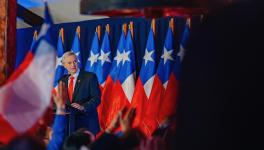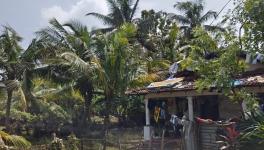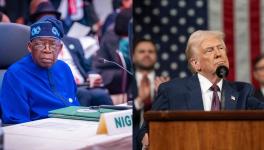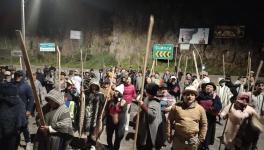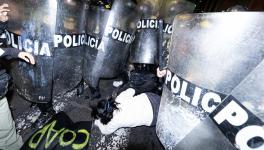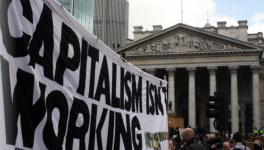Former Ecuadorian President Rafael Correa Sentenced to 8 Years in Prison
Several national and international political leaders have condemned the verdict and expressed their solidarity with the former Ecuadorian President Rafael Correa.
On April 7, Ecuador’s National Court of Justice sentenced former president Rafael Correa to eight years in prison on bribery and corruption charges. Correa has also been barred from electoral politics for 25 years.
The Court convicted Correa, former vice president Jorge Glas and 18 other former ministers and government officials on charges of accepting approximately 8 million USD in bribes from private companies in exchange for public contracts between 2012 and 2016.
President Correa rejected the charges and denounced the sentence as a form of political persecution intended to prevent him and his allies from running in the presidential elections scheduled for next year. “This was what they were looking for: manipulating justice to achieve what they could never get at the polls,” said Correa in a tweet.
Correa, who is currently residing in Brussels, Belgium, with his family, has two opportunities to appeal the conviction.
What is the “Bribes 2012-2016” case?
The “Bribes 2012-2016” case, formerly known as the “Arroz Verde” or “Green Rice” case, originated in April 2019 after Mil Hojas and La Fuente digital news portals published a report on corruption cases in Ecuador. The news report alleged that Pamela Martínez, Correa’s former adviser, had received an email with a document that supposedly had information on illegal contributions from various national and international companies, including the Brazilian Odebrecht, received by Correa’s party, the Alianza Pais (AP) movement.
In August 2019, Attorney General Diana Salazar accused Correa of leading the corruption scheme and using the funds to finance the electoral campaigns and other political events of the AP.
While reading the sentence, Judge Iván León said that “the Court considers that the crime is proven, that the Attorney General’s Office demonstrated the existence of a corruption structure and that the victim of the crime is the State.” “After 32 days of evidence analysis, we determined that former president Rafael Correa knew of the undue contributions to his political movement, through his presidential advisers at the Carondelet Palace,” added Judge Iván León.
In a tweet, the former president said that the “justice was taken by political power” and described the case as “absolutely grotesque” because the existence of “bribes” has not been verified, much less “his participation.”
He also mentioned the piling up of dead bodies of the victims of the COVID-19 pandemic in the city of Guayaquil and criticized the government’s priorities in the time of the health emergency. “We have the dead bodies on the streets, but they hold a hearing to disqualify me for the next election,” he tweeted.
“I’m fine. I am concerned about my colleagues. Surely we will win internationally, because everything is bullshit, but it takes years,” wrote Correa in another tweet. In the same tweet, he urged the Ecuadorians to vote wisely. “It depends on your vote that this nightmare ends,” he wrote.
Correa’s contribution and Moreno’s betrayal
Correa, who was Ecuador’s president from 2007 to 2017, has strong popular support in the country. His rule was characterized by large-scale social welfare programs and public infrastructure projects. During his terms, Ecuador experienced an economic boom and poverty and inequality declined significantly across the country.
The current Ecuadorian president Lenin Moreno, who was Correa’s vice president from 2007 to 2013, promised to continue his legacy in the 2017 presidential election. However, after his election, Moreno drastically shifted his political stance, distancing himself from Correa’s left-wing politics and pushing forth neoliberal policies domestically and aligning Ecuador’s foreign policy with US interests.
In December 2018, a fresh wave of protests began in Ecuador. Thousands mobilized across the country against Moreno’s package of neoliberal and austerity measures and the 4.2 billion USD loan with the International Monetary Fund (IMF). Social movements and organizations have condemned Moreno for his subservient attitude to the United States and for serving its imperialist interests in the region.
Former president Correa has been a constant victim of political persecution under Moreno’s presidency. In July, 2018, the court ordered a preventive detention of Correa, accusing him of being complicit in the failed kidnapping of right-wing opposition leader Fernando Balda. In August, 2019, preventive detention was ordered against him in this corruption case.
National and International Solidarity
Several political leaders from across Latin America have condemned the judicial decision motivated by the right-wing and imperialist politics of Moreno and have expressed their solidarity with the progressive leader.
Former Bolivian president Evo Morales expressed his solidarity with Correa. “My complete solidarity with comrade Rafael Correa who is the victim of incessant political persecution. The Ecuadorian people know how much you have done for them and the Great Homeland. Until victory, always!,” tweeted Morales.
Cuban foreign minister, Bruno Rodríguez also extended his support to the former president. “We reaffirm our support and confidence in former President of Ecuador, Rafael Correa. We reject the politically motivated judicial processes against the left-wing leaders in Our América,” wrote Rodríguez in a tweet.
Venezuelan president Nicolás Maduro, Colombian opposition leader Gustavo Petro, former Honduran president Manuel Zelaya, former secretary general of the Union of South American Nations (UNASUR) Ernesto Samper, former Paraguayan president Fernando Lugo, and former Argentine goreign minister Jorge Taiana, among many other leaders, also denounced the Court’s verdict.
Get the latest reports & analysis with people's perspective on Protests, movements & deep analytical videos, discussions of the current affairs in your Telegram app. Subscribe to NewsClick's Telegram channel & get Real-Time updates on stories, as they get published on our website.










